Meals seem to at times provide the only respite from the luscious infusions of tea which hit from everywhere at once. We sit in Dafa’s dark wooden kitchen on the second floor of his home deep into Nan Nuo’s furry green forests. Below us, barely above the level of the floor lies a luncheon feast of local veggies, mountain chicken, pork, and some local fermented sour ‘weeds’. This short powerful man of tea has laid out. We are now consuming teas that take the mouth on journeys. Teas from the ancient trees, which expand, stretch and test the mouth with their power. Marco has admitted that he has forgotten about his mate entirely, which is precisely what is necessary. He needs to be – and is – overwhelmed by the power of tea. He needs to be encased in all of its soft glory.
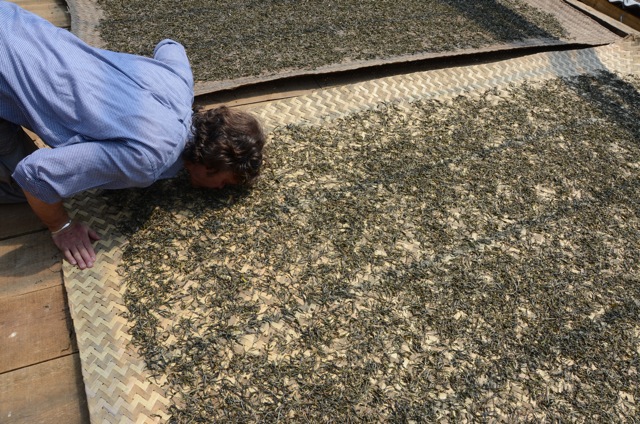
I enjoy a first first plunge into freshly drying leaves near Bang Ma (aka Heaven). The thinner the layer, the faster and more effectively the leaves dry.
We’ve been taking back cup after cup of fresh spring tea harvested a week ago which isn’t always a great idea given new tea’s extraordinarily powerful acidity and vegetal power. Newly harvested teas bring with them green pungency and while astringent, they are in many ways classics in themselves bearing with them tastes of the very earth which they have only recently been separated from. While “old” aged teas inevitably get plaudits, I’ve come to prefer these explosive packages of fresh green that have just been picked, the ‘new teas’. They cannot hide their character in any ageing. They are in many senses naked for the mouth to sample. One can taste their origins and the production – good or bad – techniques.
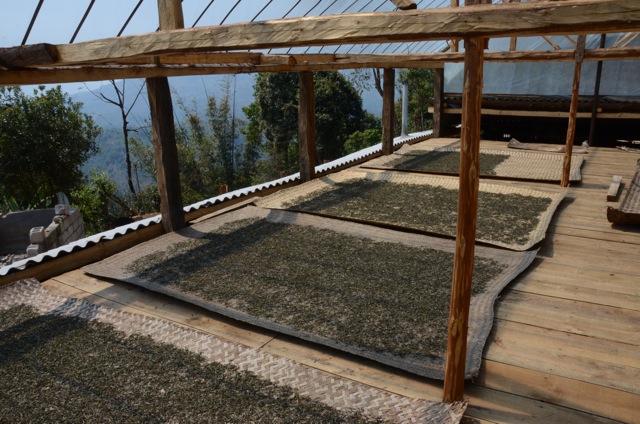
A wider view of heaven. Freshly fried tea leaves lie in a protected ‘greenhouse’. One day of drying will suffice for these beauties
Dafa’s storage room for the tea is immaculate with bags stacked and carefully marked. It is only in the last couple of years that he has begun to label and organize his teas. In the past there wasn’t even a market for his teas but now he has been led quickly down the “business path” as he carefully refers to it as and he must keep track of the harvesting period, the type of tree (ancient, new, young), and the region.
A dusty 1.5 hour drive up the red earth roads in a car, then a pick-up, then another car has taken Marco, myself, Li-shen, and Mei into the region’s stunning tea forests. I’m delirious with the fact that we’re not only in the tea mountains, but also about to eat. Dafa has forearms that look capable of being confused with trunks of some of the trees around us. In fact, he seems to be entirely constructed of muscle. He is alone at home, with his wife gone and for the last 35 minutes has been cutting, chopping, frying, and seasoning a meal capable of sating the hunger that teas can produce. His short powerful frame has the light step that so many of the mountain people have. A wide face looks at us, and gently ushers us up to eat. For locals who consume huge amounts of tea there is actually an expression of “tea-hunger” caused by the tea’s stimulant abilities.
Marco has his matè but in credit to him has been unable to find the right moment – or any moment – to introduce his own version of green stimulant. His stimulant will have to wait while my stimulant continues its magnum opus and its grand show.
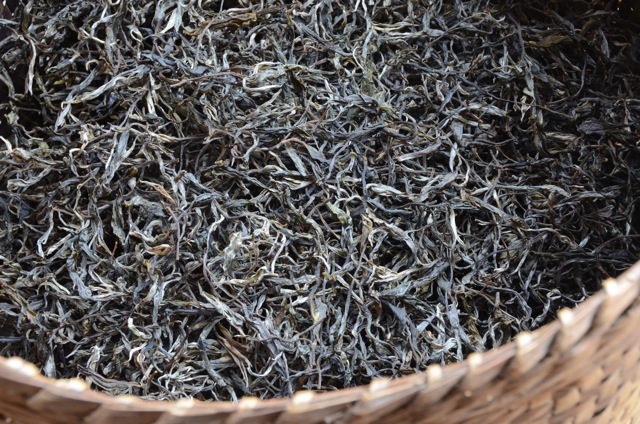
Freshly dried Bang Ma Puerh awaits our attentions. There are three ‘levels’ here, the top being ‘one ancient tree harvest of leaves’.
Marco likes the tea we’ve been drinking, while I have quietly decided it will be one of the teas that comes home for my own greedy attentions. It is a gentle freshly harvested old tree tea, that while soft, encases the backs of my molars with its sweet power. It is one of those teas that grabs the entire mouth and carefully inspects and infuses each segment of the mouth with successive amounts of force before finishing in a sweet trail.
Every village’s tea, every region and mountain has a tea that rings with characteristics, and given all of the tea-hype this year, it is important – as always – to sit, taste, sip, and sip some more. We’ve done that now for two hours and now it is time to briefly put tea aside in order to get some calories into the system. Marco’s eyes rage with what I’ve come to call the ‘tea-light’. A slightly mad, crystal clear look is upon him and is the result of repeated infusions of tea to the point where he tells me that his smile cannot be “shut off”.
Dafa opens his arms and begs us to sit. Two hours earlier this small bear of a man was hoisting himself effortlessly up into a tea tree to pluck tea leaves, and now his tea stained hands welcome us to another little luxury that isn’t so ‘little’. It is no less than a meal for 12 giants.
As potent as the teas are in this area, the local ‘firewater’ is at least as competent in releasing pulverizing power into the body as the tea was. Dafa’s own brew cannot be denied and a glass is poured in front of each one of us. It’s wonderfully syrupy consistency belies an ability to take the entire blood stream and accelerate the body and mind; sometimes at one’s contented peril.
Two glasses of the powerful firewater later and the meal is done. Early afternoon heat is broken only by small gusts of wind here at 1500 metres. Hours later, we enter back into our vehicle to take the small road back to the big road, which will in turn take us back to Menghai. The only ‘highlights’ are the memory of the tea in my mouth and the very real two large snakes taking a siesta on the dirt road ahead of little car…their languid size brings a liquid scream out of Li-shen as they casually break for the safety of the roadside.
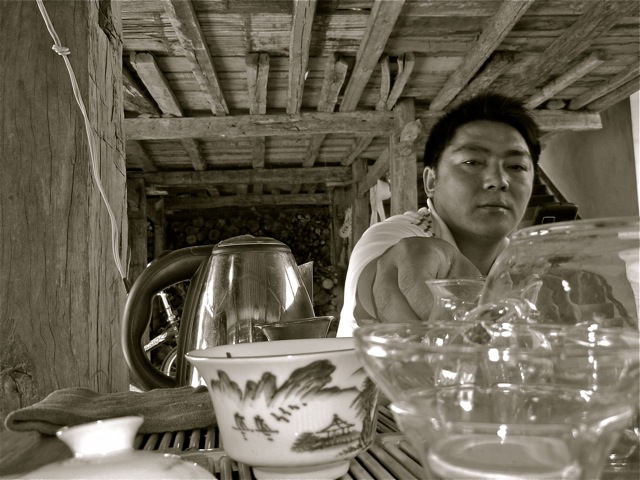
Dafa hovers over his little tea table. A full 80% of Dafa’s home is committed to the leaf that the Hani call ‘la’ – tea
Arriving back to soft coloured night and the scents evening smells that sub-tropic areas seem to have a patent on, Marco is preparing to head back to our little hotel for the night, when he is told in no uncertain terms that this isn’t a possibility. There is more tea drinking ahead to take the edge off of the night. It is one of the region’s little list of tea’s great purposes: tea to prepare for a meal, to digest a meal, to begin a day, and end the day.
Another outing to another of the region’s tea areas is discussed over sips of a new Pulang Mountain release. In most discussions in Menghai, in my experience, there is the inevitable element of discussion followed by an unpredictable flurry of activity. The problem is that there never seems any clear indication of exactly when the action will take place, there is simply an explosion of bags being packed up, bodies standing up, and a sudden exodus. So, while we know the next day will take us into Jingmai’s fabled tea forests, there isn’t a clue as to “when” that might be. It matters not.
Sipping away at a 5-year-old Banzhang tea, one of Yunnan tea cultures other endearing features is impressed yet again upon us. Friends come in to chat, to sip, to discuss tea and just share time. While there are phones on the tea table, in pockets, and being used, the remarkable aspect (or maybe the beautifully real aspect) is that people and tea are bound together in a free flowing show of unity. At one point a neighbour comes in to fix an errant water pipe. Money is politely refused and he points out that he has consumed more than his fair share of teas here; teas, that he could never afford to buy in two lifetimes. The bartering system is alive and well here in the south and the maiden of this particular tea house points out that this is one of any true teahouse’s ultimate aims and directives: to provide an informal staging point for social activities, business, and sharing.
Marco will spend another night sleepless (thankfully his last as he learns one of the little commandments of the area: ‘do not drink the powerful fresh teas at night under any circumstances due to the compelling stimulants that are alive and well ’). The little commandment perhaps should have a caveat attached to the end, “…unless one is a practised tea junkie”.
Jingmai awaits us.

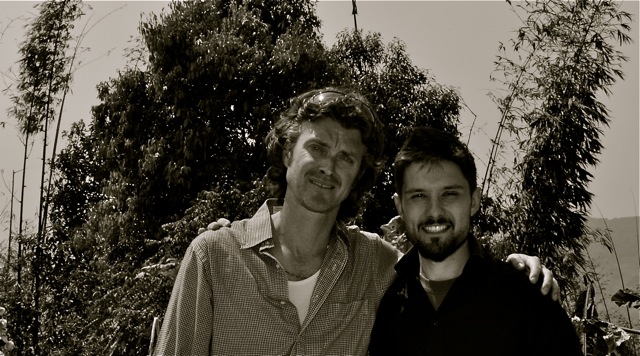
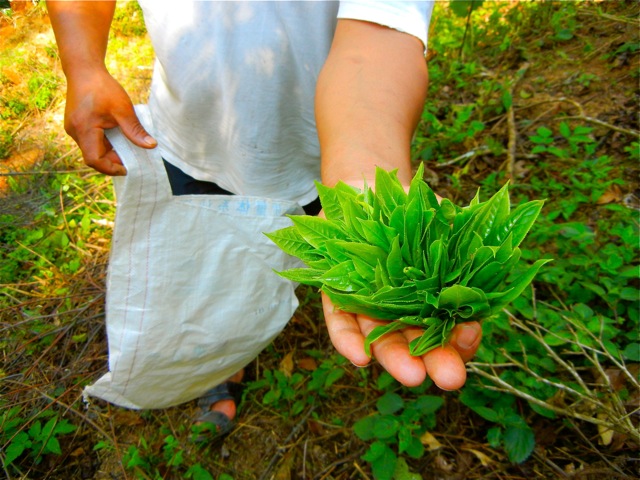
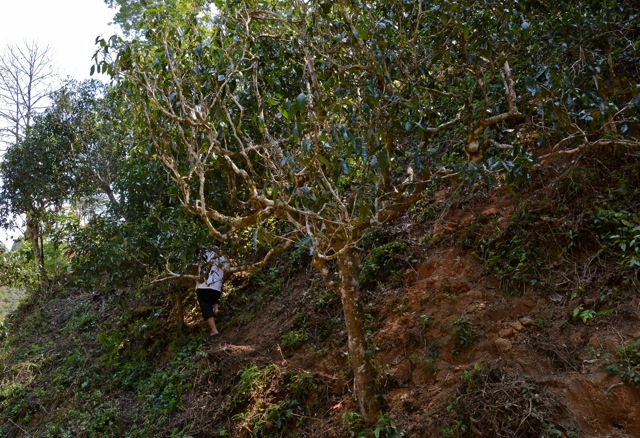
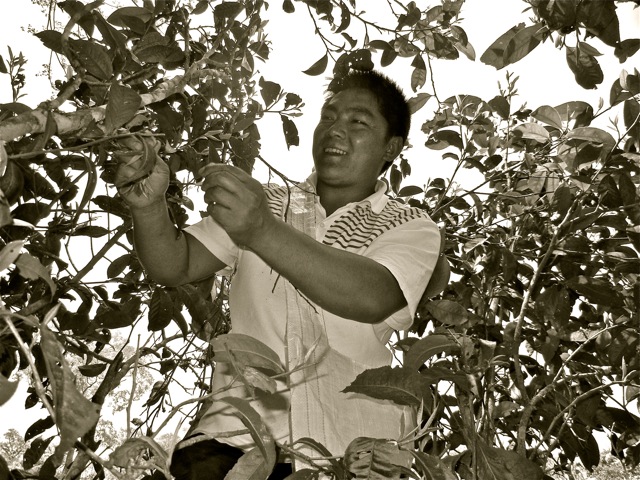
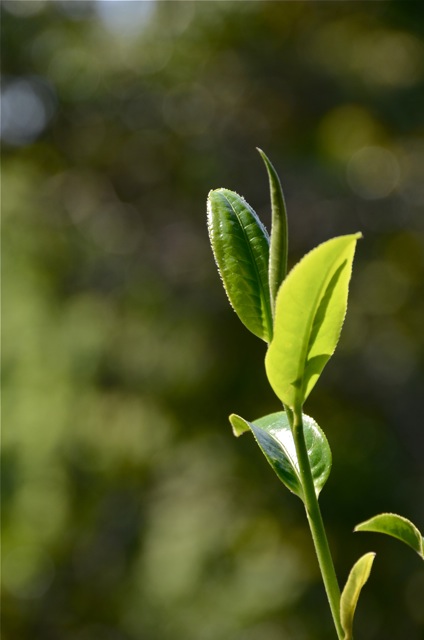
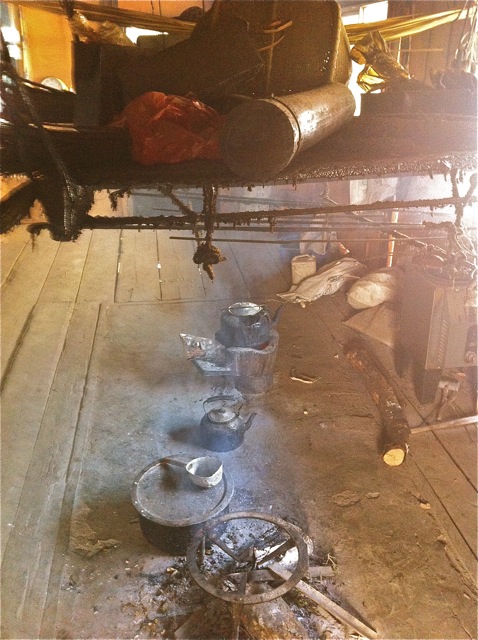
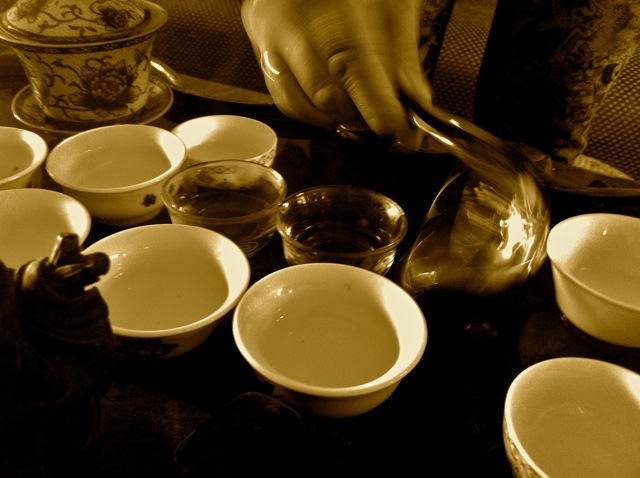

Reading this post made me feel like I was right there watching all the tea-fuelled fun, inhaling the aroma of the fresh tea. Your writing transported me. I definitely would’ve been one of those reckless late night tea drinkers. Who could resist? I can’t imagine a better reason for a sleepiness night or two.
It is a spectacle and the tea infusions just enhance the performance. Very much hope that the beautifully informal aspects of the traditional tea house continues as there are few places which open host and encourage such interaction.